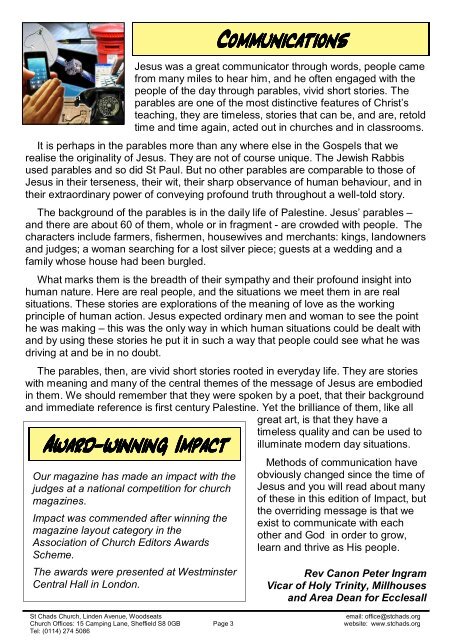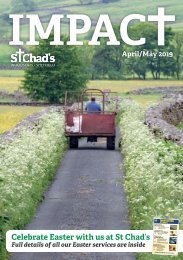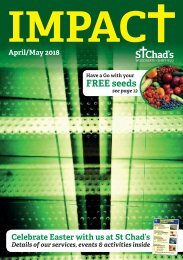2009-06
2009-06
2009-06
You also want an ePaper? Increase the reach of your titles
YUMPU automatically turns print PDFs into web optimized ePapers that Google loves.
C<br />
Jesus was a great communicator through words, people came<br />
from many miles to hear him, and he often engaged with the<br />
people of the day through parables, vivid short stories. The<br />
parables are one of the most distinctive features of Christ’s<br />
teaching, they are timeless, stories that can be, and are, retold<br />
time and time again, acted out in churches and in classrooms.<br />
It is perhaps in the parables more than any where else in the Gospels that we<br />
realise the originality of Jesus. They are not of course unique. The Jewish Rabbis<br />
used parables and so did St Paul. But no other parables are comparable to those of<br />
Jesus in their terseness, their wit, their sharp observance of human behaviour, and in<br />
their extraordinary power of conveying profound truth throughout a well-told story.<br />
The background of the parables is in the daily life of Palestine. Jesus’ parables –<br />
and there are about 60 of them, whole or in fragment - are crowded with people. The<br />
characters include farmers, fishermen, housewives and merchants: kings, landowners<br />
and judges; a woman searching for a lost silver piece; guests at a wedding and a<br />
family whose house had been burgled.<br />
What marks them is the breadth of their sympathy and their profound insight into<br />
human nature. Here are real people, and the situations we meet them in are real<br />
situations. These stories are explorations of the meaning of love as the working<br />
principle of human action. Jesus expected ordinary men and woman to see the point<br />
he was making – this was the only way in which human situations could be dealt with<br />
and by using these stories he put it in such a way that people could see what he was<br />
driving at and be in no doubt.<br />
The parables, then, are vivid short stories rooted in everyday life. They are stories<br />
with meaning and many of the central themes of the message of Jesus are embodied<br />
in them. We should remember that they were spoken by a poet, that their background<br />
and immediate reference is first century Palestine. Yet the brilliance of them, like all<br />
great art, is that they have a<br />
timeless quality and can be used to<br />
illuminate modern day situations.<br />
A- I<br />
Our magazine has made an impact with the<br />
judges at a national competition for church<br />
magazines.<br />
Impact was commended after winning the<br />
magazine layout category in the<br />
Association of Church Editors Awards<br />
Scheme.<br />
The awards were presented at Westminster<br />
Central Hall in London.<br />
Methods of communication have<br />
obviously changed since the time of<br />
Jesus and you will read about many<br />
of these in this edition of Impact, but<br />
the overriding message is that we<br />
exist to communicate with each<br />
other and God in order to grow,<br />
learn and thrive as His people.<br />
Rev Canon Peter Ingram<br />
Vicar of Holy Trinity, Millhouses<br />
and Area Dean for Ecclesall<br />
St Chads Church, Linden Avenue, Woodseats<br />
email: office@stchads.org<br />
Church Offices: 15 Camping Lane, Sheffield S8 0GB Page 3 website: www.stchads.org<br />
Tel: (0114) 274 5086


















